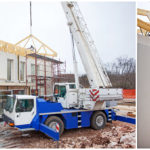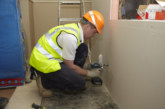The Housing, Communities and Local Government Committee is urging government to embrace modern methods of construction, warning that an over-reliance on traditional building methods will see the UK fall far short of its target to build 300,000 new homes a year by mid-2020s.
In its new report — Modern Methods of Construction — the Committee urges the Government to unlock the potential for modern methods of construction (MMC) to build homes quicker, more cheaply, while maintaining build quality. However, it says government will need to act quickly to increase capacity and improve investor confidence if it is to have a meaningful impact on UK housebuilding targets.
Modern methods of construction comprises a range of innovations including the use of new materials, digital working and precision manufacturing techniques in the house building process. MMC processes can be used alongside traditional building methods and allow for greater use of off-site construction.
At present, use of MMC in housebuilding is low and the Government will need to act quickly if it is to make an impact in meeting housebuilding targets. Supply chain capacity will need to be increased, and greater focus placed on ensuring the workforce has the required skillset for developing technologies. The Government should work with Homes England and training centres, such as the Advanced Manufacturing Research Centre, to develop targeted programmes targeted for use in the manufacture of MMC homes.
Initial work to develop centres of excellence, bringing together businesses and academia to support innovation, is welcome but could be strengthened by coordinating with the Transforming Construction Programme and Construction Innovation Hub. These networks could form an ideal arena for testing and standardisation of MMC processes and components, as well as ensuring they comply with Building Regulations.
The report says to gain the confidence of the industry as a whole, as well as consumers, government must establish a database of MMC homes to demonstrate the long-term value and durability of MMC. The Committee backs the creation of an ‘MMC Scheme’, setting out a single set of standards for warranty providers, to provide greater certainty.
The Committee says the expansion of MMC faces many additional challenges including difficulties accessing land to build on, opaque and confusing Building Regulations and high upfront costs. The Government should investigate the specific impact of the current regulatory systems and access to funding on MMC, and consider options for measures designed to overcome existing barriers.
Chair of the Housing, Communities and Local Government Committee, Clive Betts MP said: “If the Government is to have any chance of meeting its target of 300,000 new homes a year it cannot simply rely on traditional methods of construction. They must make a serious effort to support the use of new and emerging technologies that have the potential to have a transformative impact on the speed, cost and quality of home building. This is not simply about shifting production away from the building site and into factories. It is about seizing opportunities that modern technologies allow, whether it be precision manufacturing, use of new materials or digital working.
“First and foremost they must create the conditions to improve investor and consumer confidence. Reluctance is understandable. The perception is that the building innovations of the sixties created homes that failed to survive half a century, while rows of Victorian terraces are still standing. Proving quality and longevity will be key. That is why we have called on the Government to collect and publish the data that prove new building methods work, and also show if they have failed.
“The Government will also need to support the industry to grow the capacity needed for MMC to play a greater role in national housebuilding. They will need to ensure that the right training schemes and apprenticeships are in place so that we have the skilled workforce that can utilise MMC techniques. They must also work with the industry to support the development of robust supply chains and support innovative businesses develop.
“The housing system is in urgent need of a major boost and if the Government is to have any chance of meeting its ambitious target it must grasp every opportunity new technologies allow. But they must act fast and act now.”
In the 60s and 70s, local authorities were major housebuilders, contributing significantly to the total number of homes delivered. The report puts forward that if we are to get close to delivering 300,000 homes per year, local authorities must supply a significant proportion of them. Social housing is particularly well suited to MMC because it often includes large numbers of similar homes, which reduces unit costs and provides certainty of demand to the supply chain.
Pivotal role
Responding to the Housing, Communities and Local Government Committee’s report, the Local Government Association’s Housing spokesman, Cllr Martin Tett, said: “It is good that the Committee recognises the pivotal role councils can play in tackling the country’s housing crisis, and how we need to get councils building again if we are to stand any chance of meeting the Government’s house-building target of 300,000 new homes a year.
“The last time this country built homes at the scale that we need now was in the 1970s when councils built more than 40% of them. Councils were trusted to get on and build homes that their communities needed, and they delivered, and they can do so again.
“Lifting the housing borrowing cap was a big step forward, but we now need the Government to go further in the Spending Review by devolving Right to Buy so councils retain 100% of their receipts and can set discounts locally.”
Make a step change
The Housing, Communities and Local Government Committee’s report on Modern Methods of Construction, cites Centre for London’s 2018 report Made for London: Realising the potential of Modern Methods of Construction and is a welcome contribution to the debate on off-site construction.
Responding to the Committee’s report, Erica Belcher, Researcher at Centre for London said: “Off-site housing construction and manufacturing could help to achieve faster delivery on-site than traditional construction — with schemes completed in about two-thirds of the time.
“Modern Methods of construction could also help to shift the workload from construction sites to the more controlled, safer environment of factories, reduce local environmental impact, and help to diversify the workforce.
“But the transition to widespread adoption of off-site construction and manufacturing has been slow. We urgently need to develop skills, improve supply chains, promote the potential of new construction techniques, and ensure supportive policy and financing structures are in place.
“This report from the Housing, Communities and Local Government Committee will put pressure on the Government to make a step change to ensure that these methods can be part of the solution to the UK’s housing crisis.”
To download a copy of the Modern methods of construction guide click here.
To download a copy of the Centre for London report Made for London: Realising the potential of Modern Methods of Construction click here.
Image ©JRP/AdobeStock.









